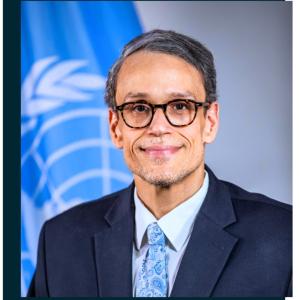Honourable Minister, Permanent Secretaries, Honourable National Assembly members, The Media, UN colleagues and a warm welcome to our UNDESA colleagues who are joining us virtually.
I am please to invite you all to this important gathering, bringing together local government officials, government counter parts, UN colleagues and strategic partners to this validation workshop of the CCA.
The CCA is a critical component of the United Nations Sustainable Development Framework (UNSDF) preparation, occurring at the very first stages of the process. It informs and underpins the Cooperation Framework with the Government of The Gambia as part our continued support to the people of this country. The CCA examines progress, gaps, opportunities, and bottlenecks vis-à-vis The Gambia’s commitment to achieving the 2030 Agenda set aside to uplift the lives and livelihoods of people across the world.
We are here today to chart a path for a new CCA that would outline the strategic support the UN system in The Gambia will continue to work on together with Government for the next five years. The last years has seen an unprecedented improvement in The Gambia especially on reforms around governance, democracy, and respect for human rights. However, the positives registered also came with some challenges. This includes shocks, like risk of Ebola, the COVID-19 pandemic, climate change and other risks also play a significant part in underachievement of SDGs, in particular increasing poverty, food, and nutrition insecurity, driving large scale rural-urban migration and unregulated overseas emigration.
Distinguished Guest, ladies and Gentlemen,
According to the Sustainable Development Report 2021, The Gambia ranked 123 out of 165 countries with a score of 59.3 (out of 100) on progress made on the achievement of SDGs. This suggests that the country is on average development trajectory (59 percent of the way to the best possible outcome across the 17 Goals). The Gambia’s progress towards the 2030 Agenda and the Sustainable Development Goals and the Africa Union Agenda 2063 is slow and average. This highlights the need to strengthen already existing partnerships, building on new ones and ensure everyone is onboard the process of national development.
This will one again be aligned to the 2030 Agenda with a focus of ensuring no single person is left behind. In this regard, the report internalized the SDGs in its own Sustainable Development Vision 2030, charting the development path of the next Cooperation Framework for the ensuing 5 years in line with 2030 Agenda.
The Gambia has the marks for progress comparable with other countries in the subregion for its strong foundation of peace. To harness this advantage, the CCA report dovetails cross-sectoral, integrated responses that support greater coherence by the UN system and partners on the ground to promote more impactful and sustainable outcomes for people. We the UN seek to deliver concrete and tangible improvements in The Gambian people’s daily lives with your support.
I look forward to your active and productive discussions today. Thank all of you for contributing to this work.
Before I conclude, I wish to reaffirm The UN” s commitment to supporting the government in building back better and to ensure progress on the SDGs and the Agenda 2030 are realized whilst leaving no one behind.
Thank you all for your attention and I wish you all a successful session.












